高三英语培优
新高三英语提分培优通关练:一轮语法 专题07 过去分词(高考真题+名校模拟+写作升格)解析版

新高三英语提分培优通关练(高考真题+名校模拟)第02辑(一轮语法专辑)专题07 过去分词(高考真题+名校模拟+写作升格)解析版目录高考真题专区1名校模拟专区4写作升格专区10高考真题专区:练真题,明方向;练技巧,提能力;练速度,提分数!考点一:考查过去分词短语作定语(与被修饰名词构成被动关系)1.(2024新课标II卷)Two years later, a six-meter-tall pavilion, (inspire) by The Peony Pavilion, was built at the Firs Garden, just ten minutes’ walk from Shakespeare’s birthplace.答案: inspired考查非谓语动词。
句意:两年后,一座六米高的亭子在菲斯花园落成,该花园距离莎士比亚故居仅十分钟步行路程,其灵感来自《牡丹亭》。
非谓语动词担当后置定语,被修饰词“a six-meter-tall pavilion”和动词“inspire”之间为被动关系,用过去分词形式。
故填inspired。
2.(2024浙江1月卷)Over the last two years, some supermarkets have started selling chicken or salad in packs __________ (design) with two halves containing separate portions (份).答案: designed考查过去分词。
句意:在过去的两年里,一些超市开始销售鸡肉或沙拉包装,设计成两半,拆分成两份。
动词design意为“设计”,和谓语之间没有连词,和逻辑主语packs构成被动关系,且动作已完成,所以应用过去分词形式作后置定语。
故填designed。
3.(2023新课标I卷)Shanghai may be the (recognize) home of the soup dumplings but food historians will actually point you to the neighboring canal town of Nanxiang as Xiao long bao’s birthplace.答案:recognized解析:考查非谓语动词。
高三英语培优补差方案

高三英语培优补差方案为顺利完成本学期的教学任务,提高本学期的教育教学质量,我根据学生的实际情况,围绕教学目标,制定本学期的培优补差方案。
除了认真备课、上课、批改作业、优质完成每一节课的教学外,还采取课内外培优补差措施,制定培优补差计划,以高度的责任心投入到紧张的教学及培优补差工作中,力争取得好成绩。
一、思想方面的培优补差。
1、做好学生的思想工作,经常和学生谈心,关心他们,关爱他们,让学生觉得老师是重视他们的,激发他们学习的积极性。
了解学生们的学习态度、学习习惯、学习方法等。
从而根据学生的思想心态进行相应的辅导。
2、定期与学生家长、班主任联系,进一步了解学生的家庭、生活、思想、课堂等各方面的情况。
二、有效培优补差措施。
利用课余时间,对不同情况的同学进行辅导、提高,“因材施教、对症下药”,根据学生的素质采取相应的方法辅导。
培优方面:对那些学习习惯较好,能认真听讲、思维活跃、勤学好问,善于发现解决问题的关键,对知识的应用能力较强;课堂积极发言,课后及时复习;基本上掌握了英语学习的学习方法和学习技巧的学习优秀的学生采取以下方法:1、课堂上拓展学生知识面,扩大阅读量;2、加强基础知识与交际运用能力的训练;3、对个别突出的学生进行单独辅导;4、在每一次的检测练习中,注重对优生情况的检查,及时发现问题,及时解决问题。
5、多沟通、多鼓励。
在优生中树立榜样,给机会表现,调动他们的学习积极性和成功感。
通过培优工作,争取使这部分学生的知识面更拓展,阅读和写作能力提高,综合能力及应考能力全面提高。
补差方面:对少数缺乏学习兴趣和积极性,学习习惯差,上课不认真听讲,经常开小差,对基础知识没有基本的了解和掌握;学习态度不端正,学习态度消极,无所谓的态度很突出;没有基本学习方法;不能完成老师布置的要求任务;对不懂的知识点也常常不理睬,对知识的应用较差的学生采取以下措施:1、对书本基础知识点进行过关。
2、上课多提问,抓住差生的注意力,注意培养他们的英语学习兴趣。
【补差计划】高三英语培优补差计划

高三英语培优补差计划
为了让学生的英语成绩有进一步的提高,力争完成学校下定的目标和任务,特制订如下培优补差计划。
一.培优目标
1.精选学生。
高三 (5)和( 6)班各选出前十五名作为培优目标。
2.每个同学根据自己的现状,明确自己的学习目标和学习计划。
老师根据每个学生的情况,提出个性化的建议。
3.学习辅导。
英语自习课夯实基础,作业写作面批面改。
做好心里指导,及时了解学生情况。
二.具体措施
1.确立以“夯实基础 ,注重方法指导 ,提高解题能力”为主的培优补差指导思想。
2.课堂练习分成三个层次:第一层“必做题”—基础题,第二层:“选做题”—中等题,第三层“思考题”--拓广题。
满足不同层次学生的需要。
3.功在课前,效在课上,成果巩固在课后培优。
培优补差尽可能“耗费最少的必要时间和必要精力”。
4.备好学生、备好教材、备好练习,上好课,才能保证培优补差的效果。
三.在培优补差中注意几点:
1.不歧视学习基础差的和表现不好的学生,所有一视同仁。
2、对于学生的作业完成情况要及时地检查,并做出评价。
3、建立学习档案,及时进行学习反馈。
新高三英语提分培优通关练:一轮语法 专题01 定语从句(高考真题+名校模拟+写作升格)解析版
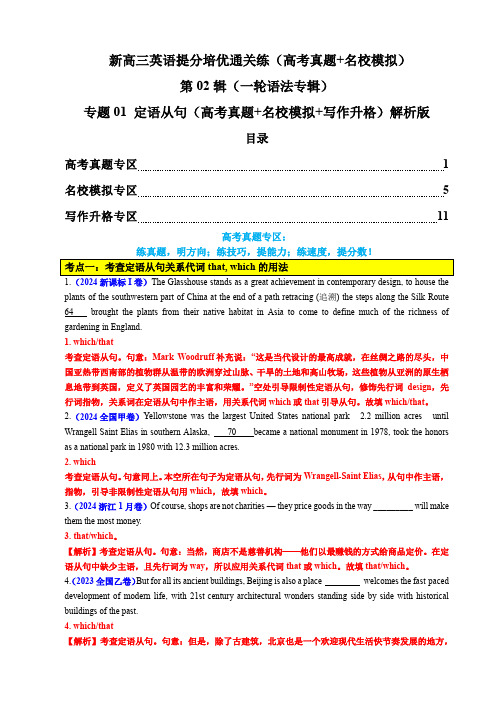
新高三英语提分培优通关练(高考真题+名校模拟)第02辑(一轮语法专辑)专题01 定语从句(高考真题+名校模拟+写作升格)解析版目录高考真题专区1名校模拟专区5写作升格专区11高考真题专区:练真题,明方向;练技巧,提能力;练速度,提分数!1.(2024新课标I卷)The Glasshouse stands as a great achievement in contemporary design, to house the plants of the southwestern part of China at the end of a path retracing (追溯) the steps along the Silk Route 64 brought the plants from their native habitat in Asia to come to define much of the richness of gardening in England.1. which/that考查定语从句。
句意:Mark Woodruff补充说:“这是当代设计的最高成就,在丝绸之路的尽头,中国亚热带西南部的植物群从温带的欧洲穿过山脉、干旱的土地和高山牧场,这些植物从亚洲的原生栖息地带到英国,定义了英国园艺的丰富和荣耀。
”空处引导限制性定语从句,修饰先行词design,先行词指物,关系词在定语从句中作主语,用关系代词which或that引导从句。
故填which/that。
2.(2024全国甲卷)Yellowstone was the largest United States national park -2.2 million acres -until Wrangell-Saint Elias in southern Alaska, 70 became a national monument in 1978, took the honors as a national park in 1980 with 12.3 million acres.2. which考查定语从句。
高三英语培优辅差计划措施
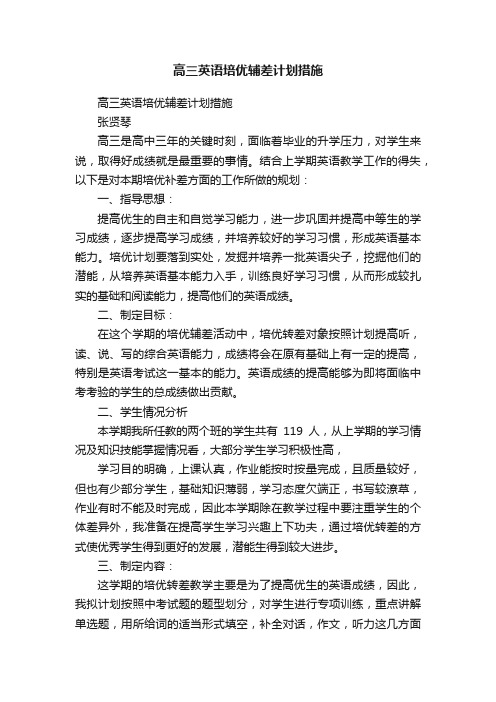
高三英语培优辅差计划措施高三英语培优辅差计划措施张贤琴高三是高中三年的关键时刻,面临着毕业的升学压力,对学生来说,取得好成绩就是最重要的事情。
结合上学期英语教学工作的得失,以下是对本期培优补差方面的工作所做的规划:一、指导思想:提高优生的自主和自觉学习能力,进一步巩固并提高中等生的学习成绩,逐步提高学习成绩,并培养较好的学习习惯,形成英语基本能力。
培优计划要落到实处,发掘并培养一批英语尖子,挖掘他们的潜能,从培养英语基本能力入手,训练良好学习习惯,从而形成较扎实的基础和阅读能力,提高他们的英语成绩。
二、制定目标:在这个学期的培优辅差活动中,培优转差对象按照计划提高听,读、说、写的综合英语能力,成绩将会在原有基础上有一定的提高,特别是英语考试这一基本的能力。
英语成绩的提高能够为即将面临中考考验的学生的总成绩做出贡献。
二、学生情况分析本学期我所任教的两个班的学生共有119人,从上学期的学习情况及知识技能掌握情况看,大部分学生学习积极性高,学习目的明确,上课认真,作业能按时按量完成,且质量较好,但也有少部分学生,基础知识薄弱,学习态度欠端正,书写较潦草,作业有时不能及时完成,因此本学期除在教学过程中要注重学生的个体差异外,我准备在提高学生学习兴趣上下功夫,通过培优转差的方式使优秀学生得到更好的发展,潜能生得到较大进步。
三、制定内容:这学期的培优转差教学主要是为了提高优生的英语成绩,因此,我拟计划按照中考试题的题型划分,对学生进行专项训练,重点讲解单选题,用所给词的适当形式填空,补全对话,作文,听力这几方面的内容,在课堂上精讲,夯实学生的基础知识,并布置一定的练习,有针对性地训练,提高学生的做题能力。
四、主要措施1.认真备好每一次培优转差教案,努力做好学习过程的知识性和实效性相结合。
2.制定切实可行的培优转差计划,严格按计划实施,注重过程,注重效率,注重效果。
进行集体培优。
把优生集中在一起定时定点进行。
高中英语培优最完整方案(4份)

高中英语培优最完整方案(4份)尊敬的领导和老师们,今天我将向大家介绍英语培优的思路和措施,主要分为整体思路、学情分析、目标设计和具体措施四个方面。
首先是整体思路。
高三学生将由学生转变为考生,老师也将由教师转变为教练,共同解决问题,提高分数。
其次是学情分析。
我们通过汇总培优生最近的测试题,并与学生一起分析试卷,找到薄弱点,并制定个性化的措施,帮助学生解决薄弱点。
然后是目标设立。
我们为尖子生设定了英语目标成绩140+,包括阅读、语法填空、短文改错全对,完型填空出错不超过两个,作文保证在20分以上。
对于成绩较差的学生,我们会为他们设置阶段目标,逐步向最高目标推进。
最后是具体措施。
我们采取了词汇攻坚的措施,包括分摊记忆、滚动检查和课外拓展。
此外,我们还因生制宜,精准施策,为每个学生量身定制研究计划。
希望通过这些措施,能够帮助学生在英语研究中取得更好的成绩。
谢谢大家。
通过针对学生题和个性的细致分析和针对性的培训,提高学生的英语研究能力和成绩,实现高中英语培优补差工作的目标。
二、具体措施:1.学生题分析:要求学生将阅读理解和完型填空的错题类型标在题干左侧,并汇总到为他们特制的表格上,让学生对错题类型有清晰的认识,针对学生的问题进行批量训练,直到学生完全掌握该题型。
针对语法填空和改错两个题型,让学生建立错题积累本,重复做错过的题,巩固知识点和语法点。
2.学生个性分析:根据学生个性特点采取不同的培训方式,以督为主的方式加大检查力度,促进研究,以导为主的方式多谈做题技巧,帮助学生树立信心。
3.书面表达训练:以整齐美观的书写和切题优质的内容为目标,从字体大小、单词间距、倾斜角度、标点符号四个方面对学生严格要求,落实“手把手”的模式,进行练字任务,要求学生依据老师指出的问题对作文进行修改、重写,直到学生把自己的作文修改成20+为止。
三、实施效果:通过以上措施的实施,学生可以有效地监控、评价、反思和调整自己的研究内容和进程,提升学生的研究能力和成绩,达到高中英语培优补差工作的目标。
高三英语培优扶差材料
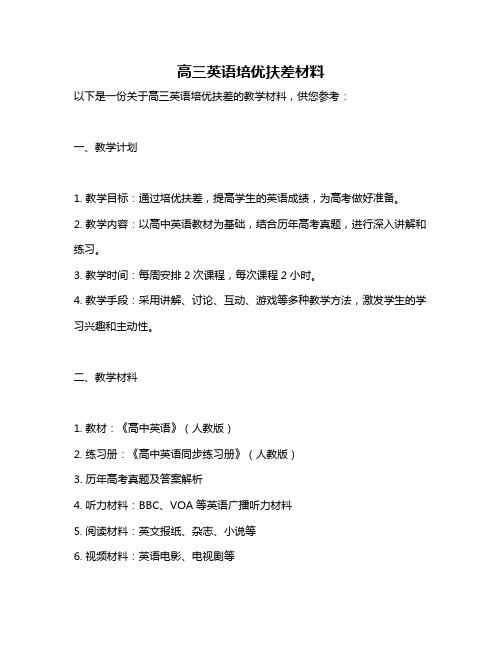
高三英语培优扶差材料以下是一份关于高三英语培优扶差的教学材料,供您参考:一、教学计划1. 教学目标:通过培优扶差,提高学生的英语成绩,为高考做好准备。
2. 教学内容:以高中英语教材为基础,结合历年高考真题,进行深入讲解和练习。
3. 教学时间:每周安排2次课程,每次课程2小时。
4. 教学手段:采用讲解、讨论、互动、游戏等多种教学方法,激发学生的学习兴趣和主动性。
二、教学材料1. 教材:《高中英语》(人教版)2. 练习册:《高中英语同步练习册》(人教版)3. 历年高考真题及答案解析4. 听力材料:BBC、VOA等英语广播听力材料5. 阅读材料:英文报纸、杂志、小说等6. 视频材料:英语电影、电视剧等7. 教学PPT:根据教学内容制作PPT,帮助学生更好地理解知识点。
三、教学步骤1. 讲解知识点:根据教材内容,深入讲解知识点,帮助学生理解并掌握重点难点。
2. 练习题讲解:针对练习册中的题目,进行详细的答案解析和解题技巧讲解。
3. 高考真题演练:组织学生练习历年高考真题,提高学生的应试能力和答题技巧。
4. 听力训练:通过听力材料,提高学生的英语听力水平。
5. 阅读训练:通过阅读材料,提高学生的阅读能力和阅读速度。
6. 视频教学:通过观看英语电影、电视剧等视频材料,提高学生的英语听说能力。
7. 互动讨论:组织学生进行互动讨论,鼓励学生用英语表达自己的观点和看法。
8. 小结与反馈:对学生的学习情况进行总结和反馈,帮助学生发现自己的不足之处并加以改进。
四、注意事项1. 根据学生的学习情况,进行个性化的辅导和指导。
2. 注意培养学生的自主学习能力和良好的学习习惯。
高三英语培优辅导方案

高三英语培优辅导方案一、辅导背景高三是学生在中学阶段的关键时期,英语作为重要的学科之一,对于学生的高考成绩和未来发展有着至关重要的影响。
为了帮助英语成绩优秀的学生进一步提高,突破瓶颈,特制定本培优辅导方案。
二、辅导目标1、提高学生的英语综合能力,包括听、说、读、写、译等方面。
2、帮助学生在高考中取得优异的英语成绩,达到 130 分以上。
3、培养学生的英语思维能力和自主学习能力,为未来的学习和发展打下坚实的基础。
三、辅导对象英语成绩在 110 分以上,有较强的学习能力和自我管理能力,有意愿进一步提高英语成绩的高三学生。
四、辅导内容1、听力训练(1)提供多样化的听力材料,如历年高考真题、英语新闻、英语电影等,让学生熟悉不同的口音和语境。
(2)进行专项听力技巧训练,如预测、抓关键词、速记等,提高学生的听力理解能力。
(3)定期进行模拟听力测试,分析学生的错误原因,有针对性地进行辅导。
2、口语表达(1)开展口语练习活动,如英语角、小组讨论、角色扮演等,让学生有机会开口说英语。
(2)纠正学生的发音错误,注重语音语调的训练,使学生的口语更加标准、流利。
(3)培养学生用英语进行思维和表达的能力,鼓励学生在日常生活中运用英语。
3、阅读理解(1)指导学生掌握不同类型文章的阅读技巧,如记叙文、说明文、议论文等。
(2)增加学生的阅读量,推荐优秀的英语读物、杂志、报纸等,拓宽学生的知识面和词汇量。
(3)进行阅读理解专项训练,培养学生的推理判断、主旨概括、细节理解等能力。
4、写作训练(1)教授学生不同体裁的写作方法,如书信、议论文、记叙文、图表描述等。
(2)引导学生积累好词好句,丰富写作素材,提高语言表达的准确性和多样性。
(3)对学生的作文进行详细批改和讲评,指出存在的问题,提供改进建议。
5、语法和词汇(1)系统梳理高中英语语法知识,重点讲解易错、易混淆的语法点。
(2)通过语境和例句帮助学生理解和运用语法规则,提高语法运用的准确性。
英语培优补差工作计划(共6篇)

英语培优补差工作方案〔共6篇〕第1篇:英语培优补差方案2023届高三毕业班英语科培优补差方案一、指导思想:为了尽可能进步学生的英语成绩,我校展开对培养尖子生指导,学困生研究和实验,为了全面进步四、五年级的英语成绩,表达出“尖子生吃好,中等生吃饱,学困生吃了。
”二,详细目的:使优生“吃得饱”,后进生“吃得了”,快者快学,慢者慢学,先慢后快,全面进步。
三,学习情况分析^p :优生:学习习惯较好,能认真听讲,思维活泼,勤学好问,擅长发现解决问题,对知识的应用才能较强,课堂积极发言,课后及时复习,根本上掌握了一定英语学科的学习方法和学习技巧,有较好的阅读才能。
文科优生:罗润秋李晓辉黄云飘黄云凤陈淑华李丽琴朱海燕阮国君黄永威张丽丽邓秀红莫晓媛邓贵邓宝新梁月明理科优生:董家秀谢佩灵陈诗媚黄志伟吴海瑞罗友德傅博怡将雄庞霞王超杨娃花陆天华冯德柱林健廖真差生:缺乏学习兴趣和积极性,学习习惯差,上课不认真听讲,经常开小差,对根底知识没有根本的理解和掌握。
学习态度不端正,学习态度消极,无所谓的态度突出,没有学习方法,对不懂的知识点,常常不理会,对知识的应用较差。
补差对象:会考模拟考分数40分以下的同学四,详细措施:〔1〕培优措施:加强根底知识与交际运用才能的训练,拓宽知识面,多做习题。
对于优生,他们都很快完成作业,可以再给他们布置一些培优习题进展训练,给优生阅读,拓宽知识面。
要求每天定期练习听力。
使用的听力资料是《维克多听力》;争取在下学期初完成考纲词汇的复习。
详细是时间利用晚读时间,测试学生单词;每天一篇阅读,每周两天完型。
使用《三年高考两年模拟》的练习。
每周定期讲评;每两周写一次作文,老师做到一一面评。
使用《雅美英语》作为练习作文的主要材料。
〔2〕后进生辅导措施:后进生不思学习是有原因的,社会的,学校的,家庭以及个人的因素。
一、首先要做好思想工作,让他们认识到认真学习,掌握根底知识,通过会考的重要性。
二、在11月中旬开场,利用第9节给后进生辅导。
新高三英语提分培优通关练:一轮语法 专题09 动词时态语态(过去时)(高考真题+名校模拟)解析版
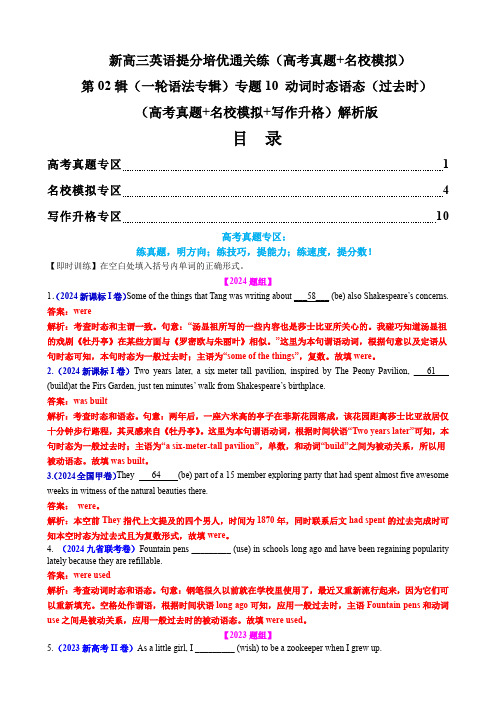
新高三英语提分培优通关练(高考真题+名校模拟)第02辑(一轮语法专辑)专题10 动词时态语态(过去时)(高考真题+名校模拟+写作升格)解析版目录高考真题专区1名校模拟专区4写作升格专区10高考真题专区:练真题,明方向;练技巧,提能力;练速度,提分数!【即时训练】在空白处填入括号内单词的正确形式。
【2024题组】1.(2024新课标I卷)Some of the things that Tang was writing about ___58___ (be) also Shakespeare’s concerns.答案:were解析:考查时态和主谓一致。
句意:“汤显祖所写的一些内容也是莎士比亚所关心的。
我碰巧知道汤显祖的戏剧《牡丹亭》在某些方面与《罗密欧与朱丽叶》相似。
”这里为本句谓语动词,根据句意以及定语从句时态可知,本句时态为一般过去时;主语为“some of the things”,复数。
故填were。
2.(2024新课标I卷)Two years later, a six-meter-tall pavilion, inspired by The Peony Pavilion, ___61___ (build)at the Firs Garden, just ten minutes’ walk from Shakespeare’s birthplace.答案:was built解析:考查时态和语态。
句意:两年后,一座六米高的亭子在菲斯花园落成,该花园距离莎士比亚故居仅十分钟步行路程,其灵感来自《牡丹亭》。
这里为本句谓语动词,根据时间状语“Two years later”可知,本句时态为一般过去时;主语为“a six-meter-tall pavilion”,单数,和动词“build”之间为被动关系,所以用被动语态。
故填was built。
3.(2024全国甲卷)They 64 (be) part of a 15-member exploring party that had spent almost five awesome weeks in witness of the natural beauties there.答案:were。
高三英语培优补差教学计划

高三英语培优补差教学计划高三英语培优补差教学计划人生天地之间,若白驹过隙,忽然而已,我们的工作又将迎来新的进步,此时此刻我们需要开始做一个计划。
那么你真正懂得怎么制定计划吗?下面是我帮大家整理的高三英语培优补差教学计划,欢迎阅读,希望大家能够喜欢。
高三英语培优补差教学计划1一、指导思想提高优生的自主和自觉学习能力,进一步巩固并提高中等生的学习成绩,帮助差生取得适当进步,让差生在教师的辅导和优生的帮助下,逐步提高学习成绩,并培养较好的学习习惯,形成英语学习基本能力。
培优计划要落到实处,发掘并培养一批英语学习能手,挖掘他们的潜能,训练良好学习习惯,从而形成较扎实的基础和交际说话能力,并能协助老师进行辅差活动,提高整个班级的英语素质和英语成绩。
二、工作目标1、加强对培优补差工作的`常规管理和检查。
2、认真挑选好培优补差的对象。
3、通过培优补差,使学生能充分认识到学习的重要性。
4、认真做好学生的辅导工作,每周至少3次的辅导,辅导要有针对性和可行性。
三、具体措施1、利用课堂上多鼓励学生生动口说,优生先示范再叫中下学生跟读,给优生有自主发挥的机会,假如中下还是说错或不开口,动员全班同学勉励他,排除其心理障碍。
2、课堂上处理不好的,利用课余时间教导。
与学生多谈心,讲些小故事,激发他们学英语的兴趣。
读错、说错不要紧,最重要的是他肯开口说,循序渐进,由浅入深。
3、积极挖掘学生的闪光点。
鼓励优生用多种途径表达语言,活跃他们的思维。
多表扬中下生,只要他们有一点进步,都要及时鼓励,使其增强自信心。
4、实行一帮一活动,让中、下生有自己的“私人老师”。
培养他们团结友爱,共同进步的班风。
高三英语培优补差教学计划2一、指导思想结合本校实际情况,五年级学生之间学习、纪律等情况的异常区别,为提高优等生的自主和自觉学习能力,进一步巩固并提高中等生的学习成绩;同时帮助差生取得适当进步,让学生在教师的辅导和优生的帮助下,逐步提高学习自信心和能力,培养较好的学习生活习惯,并逐步提高纪律意识和思想道德水平,形成良好的自身素质,我把培优辅差工作当作自己教学中的一个重要的事情来进行,让培辅计划落到实处,特制定此计划。
高三英语培优补差教学计划

高三英语培优补差教学计划1. 引言高三是学生们备战高考的重要阶段,英语作为一门重要的科目,在高考中的分值也相对较高。
因此,为了帮助学生们全面提高英语水平,我们制定了高三英语培优补差教学计划。
2. 诊断测试在实施培优补差教学计划之前,我们首先进行一次英语诊断测试。
通过测试,我们可以初步了解学生们的英语水平以及个体之间的差异,并据此制定个性化的学习计划。
3. 分层教学根据学生的英语能力水平,我们将学生分成几个不同的层次,分别进行教学。
每个层次都有相应的教学内容和教学目标。
通过分层教学,我们可以更好地满足学生们的学习需求,帮助他们有针对性地进行学习。
4. 知识点讲解在教学过程中,我们将重点讲解英语的重要知识点和难点。
这些知识点包括英语的语法规则、词汇、短语搭配等等。
通过逐一讲解和示范,帮助学生们理解和掌握这些知识点,从而提高他们的英语应用能力。
5. 练习与巩固仅仅讲解知识点是不够的,我们还需要让学生们进行大量的练习和巩固。
我们将提供大量的练习题和模拟试题,让学生们进行反复的练习,以巩固所学知识,并提高解题的熟练度和效率。
6. 听力训练听力是英语学习的重要组成部分,也是高考中的一项考察内容。
因此,在培优补差教学计划中,我们将加强学生的听力训练。
通过听力材料的听写、听力题目的练习等方式,提高学生们的听力水平。
7. 阅读理解阅读理解是高考英语试卷中的一大难点。
为了帮助学生们提高阅读理解能力,我们将提供丰富的阅读材料,并引导学生们进行有效的阅读训练。
同时,我们还将教授学生们一些阅读技巧和解题方法,帮助他们更好地完成阅读理解题目。
8. 写作能力培养写作是英语学习的重要方面,也是高考中的一项必考内容。
在培优补差教学计划中,我们将注重学生的写作能力培养。
通过给学生们布置各种不同类型的写作题目,并针对性地进行指导和改进,帮助学生们提高写作水平。
9. 口语表达训练口语表达是英语学习的重要组成部分,也是高考中口试的一项考察内容。
高三英语培优卷

高三英语培优(2)一、完形填空(共20小题;每小题1分,满分20分)For a few years, I have been wearing a ring on my right hand.It’s not always the 1 ring, but it’s always a ring that has 2 on it so that when I look at it, I’m 3 or reminded of something important.I have made a 4 of buying rings like this whenever I see one in a store.Sometimes I give them away as 5 to someone like Jennie.I first met Jennie in the 6 waiting room and we had talked several times.One night I sat down beside her and 7 how her son was doing because I knew that he was in very 8 condition.She told me that she didn’t know what to do any more because it seemed none of the 9 from the doctors was good.They weren’t at all sure her son was going to 10 the accident that had hurt him so badly.With 11 in her eyes she said, “They’re 12 my hope.”I knew then that it was more than just a coincidence that I was wearing the ring that I had on that day.As she 13 to talk, I 14 slipped the ring off my finger and placed it in Jennie’s hand.I told her to wear it to member that God loved her and He would be with her through all of this.When Jennie looked down at the ring, she got excited and then held it tightly, for the word written on the ring was “HOPE”.The last day I was at the hospital, I saw Jennie in the distance as I got on the lift.She 15 and held up the hand with the ring on it as she called out to me saying, “Look, I still have Hope!”1.A.special B.expensive C.same D.valuable 2.A.words B.pictures C.names D.symbols 3.A.admired B.encouraged C.trusted D.puzzled 4.A.plan B.point C.list D.habit 5.A.gifts B.prizes C.awards D.thanks 6.A.railway B.school C.hospital D.airport 7.A.asked B.explained C.thought D.found 8.A.favorable B.normal C.serious D.excellent 9.A.advice B.news C.instructions D.comfort 10.A.defeat B.experience C.predict D.survive 11.A.apologies B.tears C.anger D.doubt 12.A.keeping up B.bringing down C.cutting off D.taking away 13.A.continued B.refused C.attempted D.started 14.A.cautiously B.quietly C.nervously D.shyly 15.A.shouted B.waved C.cheered D.hesitated二、语法填空Nowadays, it is common that parents buy 16 educational present for their children. A lot of personal computers are place under the Christmas tree this year. 17 (believe) that computers are the key to success, parents are also insisting that children 18 (teach) to use them in school as early as possible. The problem for school is 19 when it comes to computers, parents don’t always know best. Teachers found themselves caught in the middle of the problem between parent 20 (press) and wise educational decisions. Many schools are giving in to parental impatience and are purchasing hardware 21 good educational planning. Educators do not even agree on how computers should be used. Even those 22 believe that all children should have access to computers warn of potential dangers to the very young. The temptation remains strong largely 23 young children adapt so well to computers. However, not every school can afford to go into computing, and that creates 24 problem: a division between the haves and the have-nots. Very few parents are agitating for(倡导)computer instruction in poor school districts, 25 there may be barely enough money to pay the teacher.三:阅读理解CSAN FRANCISCO—A phone app(应用程序)in San Francisco gives information about open parking spots.City officials in San Francisco introduced the app to try to reduce traffic jams in the city, but some say it raises safety concerns.In this city, drivers searching for parking spots lead to 30 percent of all downtown jams, city officials think.Now San Francisco has found a solution —a phone app for spot-seekers that displays information about areas with available spaces.The system, introduced last month, relies on wireless sensors(感应器)fixed in streets and city garages that can tell within seconds if a spot has opened up.Monique Soltani, a TV reporter, said she and her sister spent 25 minutes on Friday trying to park.“We were praying to the parking god that we’d find a spot,” she said.“If we had the app, we would not have to pray to the parking god.” But the system could come with serious consequences.Some people say that drivers searching for parking could end up focusing on their phones, not the road.“It could be really distracting(使分心的),” said Daniel Simons, a professor of psychology at the University of Illinois.City officials acknowledge the potential problem.They are urging drivers to pull over before they use the city’s iPhone app, or to do so before they leave home.Nathaniel Ford, executive director of the San Francisco Municipal Transportation Agency, said safety could actually improve if drivers quickly found a spot instead of circling and getting frustrated.San Francisco has put sensors into 7,000 parking spots and 12,250 spots in city garages.If spaces in an area open up, the sensors communicate wirelessly with computers that in turn make the information available to app users within a minute, said Mr.Ford, of the transportation agency.On the app, a map shows which blocks have lots of places (blue)and which are full (red).More than 12,000 people have download ed San Francisco’s app, which is available now only for the iPhone but which city officials say they hope to bring to all similar devices.When it is started up, the city’s parking app warns drivers not to use the system while in motion.But safety advocates said that might not be sufficient.After all, they say, texting while driving is illegal in California and in many states, but a number of surveys, including one by the Pew Research Center, show that many Americans do it anyway.Elizabeth Stampe, executive director of Walk San Francisco, a pedestrian advocacy group, said she hoped the new parking app would lead to fewer accidents.“It’s an innovative idea,” she said.“The safe way for people to use the device is for them to pull over, which they know they should do.The question is whether they will.”But Ms.Soltani, the TV reporter, said using the app would probably join the group of activities already performed by drivers.“We’re already looking at Google Maps and Facebook on the phone while we drive,” she said.“Aren’t we always looking at something on our phone, or changing the radio, or drinking coffee? You’re always slightly distracted when you’re driving.”1.According to the text, San Francisco city officials __________.A.don’t consider the app distrac tingB.advise drivers to park cars slowlyC.are aware of the app’s disadvantagesD.believe more parking spots are needed2.How do drivers locate the parking spots?A.Sensors✂computers✂app.B.App✂computers✂sensors.C.Sensors✂app✂computers.D.Computers✂app✂sensors.3.The phone app mentioned in the text ________.A.is a bit slow in reacting B.hasn’t been put into serviceC.was introduced several years ago D.can’t be downloaded to all phones 4.Which of the following is TRUE according to the text?A.Daniel Simons thinks the app convenient.B.San Francisco will put more sensors into use.C.Most drivers open the app once they start their cars.D.Nathaniel Ford doesn’t doubt the practical use of the app.5.What’s the ma in idea of the passage?A.Safety concerns are voiced about a phone app aimed at helping drivers find parking spots.B.A phone app has been introduced to relieve the pressure on traffic in the city.C.Looking for parking spots contributes greatly to downtown traffic jams.D.Drivers’ attention is distracted in one way or another when they are driving.第二节:请从以下选项(A、B、C、D、E和F)中选出符合各段意思的小标题,并在答题纸上将相应选项的标号涂黑。
高三英语培优辅差计划措施

高三英语培优辅差计划措施张贤琴高三是高中三年的关键时刻,面临着毕业的升学压力,对学生来说,取得好成绩就是最重要的事情。
结合上学期英语教学工作的得失,以下是对本期培优补差方面的工作所做的规划:一、指导思想:提高优生的自主和自觉学习能力,进一步巩固并提高中等生的学习成绩,逐步提高学习成绩,并培养较好的学习习惯,形成英语基本能力。
培优计划要落到实处,发掘并培养一批英语尖子,挖掘他们的潜能,从培养英语基本能力入手,训练良好学习习惯,从而形成较扎实的基础和阅读能力,提高他们的英语成绩。
二、制定目标:在这个学期的培优辅差活动中,培优转差对象按照计划提高听,读、说、写的综合英语能力,成绩将会在原有基础上有一定的提高,特别是英语考试这一基本的能力。
英语成绩的提高能够为即将面临中考考验的学生的总成绩做出贡献。
二、学生情况分析本学期我所任教的两个班的学生共有119人,从上学期的学习情况及知识技能掌握情况看,大部分学生学习积极性高,学习目的明确,上课认真,作业能按时按量完成,且质量较好,但也有少部分学生,基础知识薄弱,学习态度欠端正,书写较潦草,作业有时不能及时完成,因此本学期除在教学过程中要注重学生的个体差异外,我准备在提高学生学习兴趣上下功夫,通过培优转差的方式使优秀学生得到更好的发展,潜能生得到较大进步。
三、制定内容:这学期的培优转差教学主要是为了提高优生的英语成绩,因此,我拟计划按照中考试题的题型划分,对学生进行专项训练,重点讲解单选题,用所给词的适当形式填空,补全对话,作文,听力这几方面的内容,在课堂上精讲,夯实学生的基础知识,并布置一定的练习,有针对性地训练,提高学生的做题能力。
四、主要措施1.认真备好每一次培优转差教案,努力做好学习过程的知识性和实效性相结合。
2.制定切实可行的培优转差计划,严格按计划实施,注重过程,注重效率,注重效果。
进行集体培优。
把优生集中在一起定时定点进行。
让优生有动力同时也有竞争的感觉。
高三英语培优补差教学计划

高三英语培优补差教学计划概述:高三学生在备战高考的关键时期,英语作为一门重要的科目,培优补差教学计划的实施对于提高学生的英语水平和成绩至关重要。
本文将介绍一种高三英语培优补差教学计划的实施方案,旨在帮助学生充分掌握英语知识和提高英语应试能力。
第一部分:课堂教学1. 教学目标设定英语课堂的培优补差教学计划应明确教学目标,以提高学生的语言运用能力为核心目标,同时注重对学生学习兴趣的培养,促进他们主动参与学习。
2. 教学内容设计根据学生的实际情况和前期学习进度,制定教学内容,包括单元知识点、重点词汇、语法和写作等要点。
同时,根据学生个别差异,设置有针对性的补差项目,帮助弱势学生提高英语成绩。
3. 教学方法选择为了提高学生的学习效果,课堂教学应采取多种教学方法,如互动式教学、合作学习等,创造多样化、灵活性强的教学环境,激发学生的学习兴趣和主动性。
4. 作业布置与批改在培优补差教学计划中,作业的布置和批改非常关键。
教师应合理布置作业,确保学生能够巩固所学知识,并及时批改作业,给予学生明确的指导和建议。
第二部分:个性辅导1. 学习计划制定根据学生的个体情况,制定个性化的学习计划,包括课内和课外的学习内容和时间安排。
教师和家长应协同合作,共同制定合理有效的学习计划。
2. 辅导方式选择辅导方式应根据学生的需求和学习风格进行选择。
可以采用一对一辅导、小组辅导、网络辅导等形式,以确保每个学生都得到针对性的帮助和指导。
3. 学习心理疏导在高三备考阶段,学生面临着巨大的学习压力和心理负担。
教师应给予学生情感上的支持和心理上的疏导,帮助他们树立正确的学习态度和应对考试焦虑的能力。
4. 学习成果评估定期对学生的学习成果进行评估和总结,及时发现问题和不足,并采取相应的措施和调整,以不断完善培优补差教学计划。
第三部分:资源整合1. 教育资源收集教师应不断收集和整理与高三英语备考相关的教育资源,如优秀教材、辅导资料和习题集等。
这些资源可以帮助学生有针对性地进行复习和练习,提高他们的学习效果。
高中英语培优最完整方案(4份)
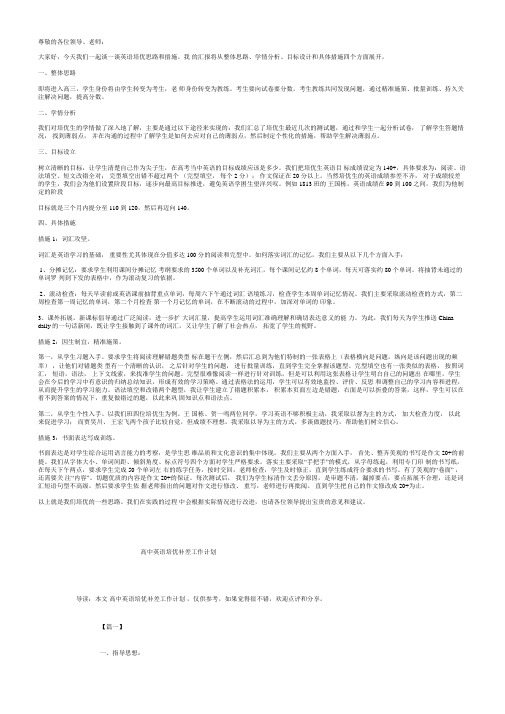
尊敬的各位领导、老师:大家好,今天我们一起谈一谈英语培优思路和措施。
我的汇报将从整体思路、学情分析、目标设计和具体措施四个方面展开。
一、整体思路即将进入高三,学生身份将由学生转变为考生,老师身份转变为教练。
考生要向试卷要分数。
考生教练共同发现问题,通过精准施策、批量训练、持久关注解决问题,提高分数。
二、学情分析我们对培优生的学情做了深入地了解,主要是通过以下途径来实现的:我们汇总了培优生最近几次的测试题,通过和学生一起分析试卷,了解学生答题情况,找到薄弱点,并在沟通的过程中了解学生是如何去应对自己的薄弱点,然后制定个性化的措施,帮助学生解决薄弱点。
三、目标设立树立清晰的目标,让学生清楚自己作为尖子生,在高考当中英语的目标成绩应该是多少。
我们把培优生英语目标成绩设定为 140+,具体要求为:阅读、语法填空、短文改错全对;完型填空出错不超过两个(完型填空,每个 2 分);作文保证在 20 分以上。
当然培优生的英语成绩参差不齐,对于成绩较差的学生,我们会为他们设置阶段目标,逐步向最高目标推进,避免英语学困生望洋兴叹。
例如 1813 班的王国栋,英语成绩在 90 到 100 之间,我们为他制定的阶段目标就是三个月内提分至 110 到 120,然后再迈向 140。
四、具体措施措施 1:词汇攻坚。
词汇是英语学习的基础,重要性尤其体现在分值多达 100 分的阅读和完型中。
如何落实词汇的记忆,我们主要从以下几个方面入手:1、分摊记忆:要求学生利用课间分摊记忆考纲要求的 3500 个单词以及补充词汇,每个课间记忆约 8 个单词,每天可落实约 80 个单词。
将抽背未通过的单词罗列到下发的表格中,作为滚动复习的依据。
2、滚动检查:每天早读前或英语课前抽背重点单词,每周六下午通过词汇语境练习,检查学生本周单词记忆情况。
我们主要采取滚动检查的方式,第二周检查第一周记忆的单词,第二个月检查第一个月记忆的单词,在不断滚动的过程中,加深对单词的印象。
高中英语培优
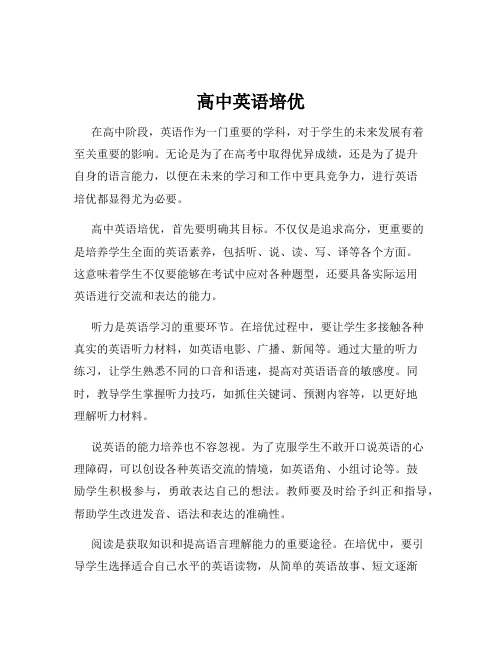
高中英语培优在高中阶段,英语作为一门重要的学科,对于学生的未来发展有着至关重要的影响。
无论是为了在高考中取得优异成绩,还是为了提升自身的语言能力,以便在未来的学习和工作中更具竞争力,进行英语培优都显得尤为必要。
高中英语培优,首先要明确其目标。
不仅仅是追求高分,更重要的是培养学生全面的英语素养,包括听、说、读、写、译等各个方面。
这意味着学生不仅要能够在考试中应对各种题型,还要具备实际运用英语进行交流和表达的能力。
听力是英语学习的重要环节。
在培优过程中,要让学生多接触各种真实的英语听力材料,如英语电影、广播、新闻等。
通过大量的听力练习,让学生熟悉不同的口音和语速,提高对英语语音的敏感度。
同时,教导学生掌握听力技巧,如抓住关键词、预测内容等,以更好地理解听力材料。
说英语的能力培养也不容忽视。
为了克服学生不敢开口说英语的心理障碍,可以创设各种英语交流的情境,如英语角、小组讨论等。
鼓励学生积极参与,勇敢表达自己的想法。
教师要及时给予纠正和指导,帮助学生改进发音、语法和表达的准确性。
阅读是获取知识和提高语言理解能力的重要途径。
在培优中,要引导学生选择适合自己水平的英语读物,从简单的英语故事、短文逐渐过渡到较复杂的英文原著、学术文章等。
培养学生的阅读技巧,如快速浏览、精读、推理判断等,提高阅读效率和理解能力。
写作能力的提升需要长期的积累和训练。
可以让学生从模仿优秀范文开始,学习不同类型文章的结构、语言表达方式和逻辑思路。
同时,注重培养学生的思维能力,让他们能够独立思考,提出自己的观点和见解,并清晰、准确地用英语表达出来。
定期进行写作练习,并给予详细的批改和反馈,让学生知道自己的不足之处,不断改进。
语法和词汇是英语学习的基础。
在培优过程中,要系统地梳理和讲解语法知识,让学生形成清晰的语法框架。
同时,通过大量的阅读和练习,帮助学生巩固语法知识的运用。
词汇的积累不能仅仅依靠死记硬背,要结合语境,让学生理解词汇的用法和搭配。
- 1、下载文档前请自行甄别文档内容的完整性,平台不提供额外的编辑、内容补充、找答案等附加服务。
- 2、"仅部分预览"的文档,不可在线预览部分如存在完整性等问题,可反馈申请退款(可完整预览的文档不适用该条件!)。
- 3、如文档侵犯您的权益,请联系客服反馈,我们会尽快为您处理(人工客服工作时间:9:00-18:30)。
易混易错选择题100例1. ①Study hard , _______ you’ll succeed.②Study hard,________ you’ll fail.A. unlessB. orC. butD. and2. ①He lived in the city of Beijing ________there’s a zhong guan cun.②He lived in the city of Beijing and _________there’s a zhong guan cun .A. in thatB. in itC. whereD. wherever3. ①It’s nine o’clock _________ we got to the station.②It’s at nine o’clock _________ we got to the station.A. asB. thatC. whenD. while4. ①_______he said so made us very happy.②_______he said made us very happy.A. WhichB. What _______C. ThatD. it5. ①Is this bike _______ she lost the day before yesterday?②Is this the bike _______ she lost the day before yesterday?A. thatB. whatC. the oneD. it6. ①_______is well known ,Hong Kong has been returned to our motherland.②_______ is well known that Hong Kong has been returned to our motherland.A. WhichB. AsC. ItD. That7. ①He must have lived here for 10 years, _______ he?②He must have finished the work yesterday, _______ he ?A. mustn’tB. haven’tC. didn’tD. hasn’t8. ①There _______ no buses, we had to walk home.②There _______ no buses, so we had to walk home.A. isB. wereC. areD. being9. ①We young people should go _______ we’re most needed.②We young people should go to _______ we’re most needed.A. the place whichB. whereC. the place whereD. which10.①He is one of the students who _______ good at drawing.②He is the one of the students who _______ good at drawing.A. isB. doesC. areD. do11. ①The book is worth _______ ,I think.②The book is worth of _______ ,I think.A. to readB. being readC. readingD. read12.①The little girl had no choice but _______ at home.②The little girl could do nothing but _______ at home.A. to stayB. to stayingC. stayedD. stay13.①New York is much larger than _______ in America.②New York is much larger than _______ in India.A. other cityB. any cityC. all citiesD. any other city14. ①Many students find _______ difficult to learn.②Many students find _______ language difficult to learn.A. EnglishB. an EnglishC. the EnglishD. England15. ①We will never forget the days _______ we spent together.②We will never forget the days _______ we worked together.A. thatB. whereC. on whichD. when16. ①Tom got the first place, _______ made his parents happy.②Tom got the first place, and _______ made his parents happy.A. asB. whichC. thatD. this17. ①He needs _______ on.②The doctor needs _______ on him.A. to operateB. being operatedC. operateD. to be operated18. ①He is unfit for the job , _______?②He isn’t fit for the job , _______ ?A. isn’t heB. is heC. doesn’t heD. dose he19. ①Let’s go at once, _______ ?②Let us go at once, _______ ?A. will youB. shall weC. do youD. does he20.①Our teacher entered the classroom, _______ .②Our teacher entered the classroom, with _______.A. a book in handB. book in handC. a book in his handD. book in21.①_______ many times, so he could understand it.②_______ many times, he couldn’t understand it.A. Having been toldB. Having toldC. He had been toldD. Though he had been told22.①The writer and scientist _______ present at the meeting.②The writer and the scientist _______ present at the meeting.A. wereB. wasC. hasD. had23. ①Three years later he turned _______ doctor.②Three years later he became _______ doctor.A. anB. aC. 不填D. the24.①My brother often plays _______ football after school.②My brother often plays _______ piano after school.A. 不填B. aC. theD. an25.①She is _______ good a teacher that we all like her .②She is _______ good teacher that we all like her.A. soB. suchC. such aD. quite a26. ①She often goes to school _______ bike.②She often goes to school _______ foot.A. inB. atC. onD. by27.①More than 70 percent of the population of these country _______ peasants.②More than 70 percent of the population of this country _______ farming-population.A. hasB. haveC. is _______D. are28. ①He as well as his brother _______ football now.②He and his brother _______ football now.A. is playingB. is playedC. are playingD. are played29. ①All of the apples _______ rotten.②All of the apple _______ rotten.A. areB. isC. have beenD. has been30.①Do you know _______ John is getting on well with his studies?②Do you know _______ John is getting on with his studies?A. howB. whichC. whatD. that31. ①The workers _______ a new hospital since the end of last year.②The workers _______ a new hospital by the end of last year.A. have builtB. have been buildingC. had builtD. were building32. ①It is 3 years _______ his brother joined the army.②It is 3 years ago _______ his brother joined the army.A. sinceB. thatC. afterD. before33. ①They don’t know _______ he will come unless told.②They don’t know _______ he will come until told.A. thatB. whetherC. how longD. if or not34. ①I _______ 10 dollars on the dictionary.②I _______ 10 dollars for the dictionary.A. tookB. costC. paidD. spent35.①He has two watches, but _______of them works well.②He has two watches, and _______ of them work well.A. bothB. noneC. neitherD. either36. ①——Who did you see in the room? ——.②——How many people did you see in the room? ——.A. No oneB. NoneC. AnyoneD. Any one37.①“You _______ be a bit tired. Why not stop to rest? ”②“You _______ be so tired that you had to stop to rest.”A. shouldB. can’tC. mustD. mustn’t38. ①Jenny _______ have kept her word. I wonder why she changed her mind.②Jenny _______ have kept her word, I wonder why she didn’t change her mind.A. mustB. shouldC. need . would39. ①This is the reason _______ you all know.②I really don’t know the reason _______ Professor Li didn’t attend the meeting.A. whyB. whichC. becauseD. that40. ①He asked us the question _______ the film was worth seeing.②He made the suggestion _______ the meeting should be put off.A. when where C. that D. whether41.①He is working hard, _______ every one of us can see.②He passed the exam, _______ pleased every one of us.A. asB. itC. thatD. which42.①_______ studies hard will make greater progress.②_______ will come to finish this task hasn’t been decided yet.A. WhoB. WhoeverC. WhateverD. No matter who43.①I’m sure _______ he finished the task on time yesterday.②I’m not sure _______ he will finish the task on time.A. whetherB. whichC. ifD. that44. ①Is this park _______ he visited the other day?②Is this the park _______ he visited the other day?A. in whichB. the oneC. 不填D. where45.①She didn’t leave the classroom _______ she had finished the homework.②She got to the station _______ the bus left.A. tillB. sinceC. whileD. before46. ①It won’t be long _______ we meet again.②He came soon _______ we had watered the garden.A. tillB. sinceC. afterD. before47. ①_______ hard it may be, I will carry it out.②_______ great progress I have made, there is still a long way to go.A. HowB. HoweverC. WhateverD. What48.①The reason _______ he couldn’t come was that his mother was ill.②It was _______ his mother was ill thathe couldn’t come.A. as . because C. since D. why49. ①Mary used to have _______ with her husband.②Mary is asking for you. Maybe she will have _______ with you.A. some wordsB. wordsC. the wordD. a word50.①Her composition is well written _______ some spelling mistakes.②She goes to school every day _______ Sun-day.A. exceptB. besidesC. besideD. except for51.①_______from the top of a twenty-storied building, Wuhan looks very beautiful.②_______ these pictures, he couldn’t help thinking of those days when he was in Wuhan.A. SeeingB. To seeC. SeenD. Saw52.①The question _______ at the meeting yesterday is very important.②The question _______ now at the meeting is very important.A. discussingB. discussedC. being discussedD. to be discussed53. ①Our teacher tried to speak louder in order to made us _______ .②Our teacher tried to speak louder in order to made herself _______ .A. to hearB. hearingC. heardD. hear54. ①—You have bought a new car. _______.②—Mary has bought a new car. _______ .A. So did IB. So I haveC. So I didD. So have I55. ①Time _______ , he shall go outing.②If time _______ , he shall go outing.A. permittedB. permitsC. permittingD. would permit56.①She has many novels, some of _______ are interesting.②She has many novels, and some of _______ are interesting.A. thatB. whichC. itD. them57. ①_______ many times, he has already known how to do it.②_______ many times, but he still didn’t know how to do it.A. Having been toldB. He had been toldC. Though he had been toldD. Having told58.①It was the first class _______ Miss Li taught us _______ we never forger.②It was in the first class _______ Miss Li taught us _______ we never forget it.A. that; thatB. that; andC. which; thatD. that; which59. ①_______ this road and you’ll get to the cinema.②_______ this road, you’ll get to the cinema.A. To followB. FollowC. If followingD. Following after60. ①She _______ early before she came here.②She _______ early since she came here.A. used to get upB. has used to get upC. has got used to getting upD. was used to getting up.61.①I can’t help _______ the work for her because she’s too young to do it.②I can’t help but _______ the work for her because she’s too young to do it.A. doB. didC. doingD. to doing62.①I forgot _______ her the book. I’ll go back to take it.②I forgot _______ her the book, so I went back to take it again.A. to returnB. returningC. to return backD. return63. ①He had the sick girl _______ to the hospital.②He had the sick girl _______ medicine to the hospital.A. carryB. to carryC. carryingD. carried64. ①_______ many times, but she still didn’t know how to do it.②_______ many times, she still didn’t know how to do it.A. She was taughtB. Having taughtC. Having been taughtD. She has taught65. ①We had thought what we did _______ him.②We had thought that we did _______ him.A. satisfyingB. satisfactionC. satisfiedD. satisfy66. ①She is considered _______ the dance hall.②She has considered _______ the dance hall so far.A. how to buyingB. to buyC. to have boughtD. buying67.①_______ in the magazine, I made a decision to read it again.②_______ by the magazine, I made a decision to read it.A. InterestB. InterestedC. To interestD. Being interested68.①What _______ me most was that nobody was on duty.②What was most _______ to me was that no-body was on duty.A. to surpriseB. surprisingC. surprisedD. in surprise69.①Would you like _______ to the film this evening?②Do you feel like _______ to the film this evening?A. goingB. to goC. goD. gone70.①There were 12 persons in the bus, _______ a baby②There were 12 persons in the bus, a baby _______.A. to includeB. includingC. includedD. to contain71. ①He was too busy _______ his friend.②He was very busy _______ his friend.A. in acceptingB. withC. to receiveD. receiving72. ①_______ , he could lift the heavy stone②_______ , he could not lift the heavy stone.A. Strong as he wasB. So strong as was heC. He was strong enoughD. As he was strong73. ①_______ ,we had to go home on foot yesterday.②_______ ,so we had to go home on foot yesterday.A. There being no busesB. Because there being no busesC. There were no busesD. Without any buses74.①_______ he said at the meeting surprised us all.②_______ he said nothing at the meeting surprised us all.A. WhatB. WhichC. ThatD. Whether75.①_______ we’ll have a meeting tomorrow has been decided.②_______ we’ll have a meeting tomorrow has not been decided.A. ThatB. IfC. WhetherD. what76. ①Our teacher did _______ he could to help us.②Our teacher did all _______ he could to help us.A. whatB. whichC. thatD. whom77.①The old man entered the room, _______ by his son.②The old man entered the room, his son.A. followB. to followC. followedD. following78.①The little boy would like _______ her to the cinema.②The little boy would like _______ to the cinema.A. to takeB. takingC. to be takenD. being taken79.①It was in the house _______ I saw that young man.②It was the house _______ I saw the young man.A. whichB. whatC. thatD. where80.①This is the factory _______ I worked two years ago.②This is the factory _______ I visited two years ago.A. thatB. whereC. at thatD. what81.①My mother went home, and _______ the door open.②My mother went home, _______ the door open.A. to findB. foundC. findingD. find82. ①My mother didn’t come back on April 25, _______ was my birthday.②My mother didn’t come back on April 25, _______ was a pity.A. thatB. whichC. whenD. as83. ①Could you tell me _______ to do it tomorrow?②Could you tell me _______ to do tomorrow?A. whenB. howC. whatD. that84.①These professors _______ already to the party are from England.②These professors _______ tomorrow to the party are from England.A. being invitedB. having been invitedC. invitedD. to be invited85. ①I’m sorry _______ you so much trouble.②I’m sorry for _______ you so much trouble.A. having givenB. to have been givenC. to have givenD. having been given86. ①Mary will _______ sure to go there tomorrow.②Mary _______ sure to go there tomorrow.A. areB. beC. isD. does87. ①You _______ wait until your father _______ back.②You _______ leave until you father _______ back.A. should…comesB. shouldn’t…will comeC. shouldn’t…comesD. should…will come88. ①I think he must be a good student, _______ ?②She thinks he must be a good student, ?A. mustn’t heB. doesn’t sheC. don’t theyD. isn’t he89. ①Mr Brown with his friends _______ of collecting stamps.②Mr Brown and his friends _______ of collecting stamps.A. is fondB. are fondC. fondD. fonds90.①Father promised _______ I studied harder he would take me to Beijing next summer.②Father promised he would take me toBeijing next summer if I studied harder.A. thatB. ifC. that ifD. if that91.①_______ makes me feel sad seeing you living all alone.②_______ makes me feel sad is seeing you living all alone.A. ThatB. ThisC. ItD. What92. ①_______ he come, what _______ you say to him?②_______ he comes, what _______ you say to him?A. Should…wouldB. When…wouldC. If…willD. Were to…do93. ①There is something wrong with my watch. needs repairing.②There is something wrong with my watch, needs repairing.A. ItB. WhichC. whichD. that94. ①Seeing is _______ .②To see is _______.A. believingB. believeC. to believeD. belief95. ①—Do you need a pen?—Yes, I need _______ .②I bought a pen yesterday.—I like _______ very muck.A. thisB. itC. thatD. one96.①_______ Japan lies east of China is known to all.②I don’t know _______ has happened to him now.A. IfB. WhatC. ThatD. Where97. ①It takes a lot of _______ to build a house.②A new chemical _______ will be set up soon.A. workingB. worksC. workD. job98. ①He couldn’t help _______ the housework, for he was busy.②He couldn’t help _______ at the news.A. cryB. doC. doingD. crying99. ①_______ come if you have time.②He _______ do it the other day.A. DoB. DosC. didD. Have100.①The building _______last year is a new school.②The building _______ next year is a new library.A. buildingB. builtC. to be builtD. being built【参考答案】1.DB2.CB3.CB4.CB5.CA6.BC7.DC 8.DB 9.BC 10.CA 11.CB 12.AD13.DB 14.AC 15.AD 16.BD 17.DA 18.AB 19.BA 20.BC 21.CAD 22.BA 23.CB 24.AC 25.AC 26.DC 27.DC 28.AC 29.AB 30.DA 31.BC 32.AB 33.BA 34.DC 35.CA 36.AB 37.CB 38.BA 39.DA 40.DC 41.AD 42.BA 43.DA 44.BC 45.AD 46.DC 47.BC 48.DB 49.BD 50.DA 51.CA 52.BC 53.DC 54.BD 55.CB 56.BD 57.AB 58.AB 59.BC 60.AC 61.CA 62.AB 63.DA 64.AC 65.CD 66.BD 67.DB 68.CB 69.BA 70.BC 71.CD 72.DA 73.AC 74.AC 75.AC 76.AC 77.CD 78.AC 79.CD 80.BA 81.BC 82.BD 83.BC 84.CD 85.CA 86.BC 87.AC 88.DB 89.AB 90.CA 91.CD 92.AC 93.AC 94.AC 95.DB 96.CB 97.CB 98.BD 99.AC 100.BC。
